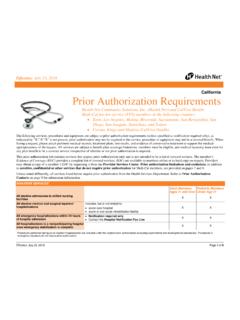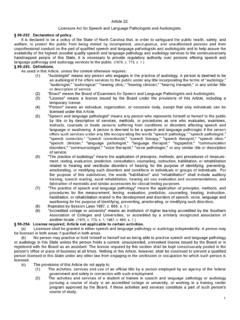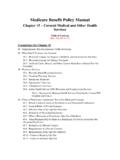Transcription of Clinical Policy: Physical, Occupational, and Speech ...
1 Page 1 of 7 Clinical policy : physical , occupational , and Speech Therapy Services Reference Number: Last Review Date: 02/19 Revision Log See Important Reminder at the end of this policy for important regulatory and legal information. Description To provide guidelines for the authorization of outpatient Speech therapy, occupational therapy, and/or physical therapy evaluation and treatment services. Initial evaluation requirements are based on the individual member benefit contract. Please refer to member benefits, state and specific plan coverage guidelines as these take precedence over Clinical policy as applicable. The definition of habilitative services vary among states and should be considered when applying this policy . policy /Criteria I. Initial Authorization It is the policy of Health Net of California that outpatient Speech therapy, occupational therapy, and/or physical therapy services are considered medically necessary when all the following criteria are met: A.
2 Signs and symptoms of physical deterioration or impairment in 1 of the following areas, or for prevention of disability in 1 of the following areas: 1. Sensory/motor ability 2. Functional status as evidenced by inability to perform basic activities of daily living (ADLs) and/or mobility 3. Cognitive/psychological ability 4. Cardiopulmonary status 5. Speech /language/swallowing ability/cognitive-communication disorders that result in disability B. Treatment is ordered by an examining physician, physican assistant or nurse practitioner and a formal evaluation is conducted by a licensed/registered Speech , occupational , or physical therapist. The evaluation must include the following: 1. History of illness or disability 2. Relevant review of systems 3. Pertinent physical assessment 4. Current and previous level of functioning 5. Tests or measurements of physical function 6. Potential for improvement in the patient s physical function 7. Recommendations for treatment and patient and/or caregiver education C.
3 Treatment requires the judgment, knowledge, and skills of a licensed/registered therapist or therapy assistant and cannot be reasonably learned and implemented by non-professional or lay caregivers. Repetitive therapy drills which do not require a licensed/certified professional s feedback are not covered services. D. Treatment meets accepted standards of discipline-specific Clinical practice, and is targeted and effective in the treatment of the member s diagnosed impairment or condition. Clinical policy physical Therapy, occupational Therapy, Speech Therapy Page 2 of 7 E. Treatment does not duplicate services provided by other types of therapy, or services provided in multiple settings. F. Treatment conforms to a plan of care (POC) specific to the member s diagnosed impairment or condition. The written POC signed by the therapist must include all of the following: 1. Diagnosis with date of onset or exacerbation 2. Short- and long- term functional treatment goals that are specific to the member s diagnosed condition or impairment, and measurable relative to the member s anticipated treatment progress.
4 Planned treatment techniques and interventions are detailed, including amount, frequency, and duration required to achieve measurable goals. 3. Education of the member and primary caregiver, if applicable. This should include a plan for exercises/interventions to be completed at home between sessions with the therapist. 4. A brief history of treatment provided to the member by the current or most recent provider, if applicable. 5. A description of the member s current level of functioning or impairment, and identification of any health conditions which could impede the member s ability to benefit from treatment. 6. Member s most recent standardized evaluation scores, with documentation of age equivalency, percent of functional delay, or standard deviation (SD) score, when appropriate, for the member s diagnosis/disability. 7. Providers should also include any meaningful Clinical observations, summary of a member s response to the evaluation process, and a brief prognosis statement.
5 G. Treatment is expected to either: 1. Produce clinically significant and measurable improvement in the member s level of functioning within a reasonable, and medically predictable, period of time; OR 2. Prevent significant functional regression as part of a medically necessary program and: a. If member is under 21 years and achieves a Clinical and functional plateau, the provider adjusts the POC, and provides monthly (or as appropriate) reassessments to update and modify the home care program. If the member's functional level is in jeopardy or declining, the POC can be adjusted accordingly by the therapy provider. b. EPSDT (early and periodic screening, diagnosis and treatment) members: members who are receiving EPSDT services may continue to receive medically necessary therapies where loss or regression of present level of function is likely within a reasonable and medically predictable period of time. H. Where appropriate, nationally recognized Clinical decision support criteria will be used as a guideline in the medical necessity decision making process.
6 II. Continued Authorization A. Treatment progress must be clearly documented in an updated POC/current progress summary signed by the therapist, as submitted by the requesting provider at the end of each authorization period and/or when additional visits are being requested. Documentation must include the following: Clinical policy physical Therapy, occupational Therapy, Speech Therapy Page 3 of 7 1. The member s updated standardized evaluation scores, with documentation of age equivalency, percent of functional delay, or SD score, if applicable. 2. Objective measures of the member s functional progress relative to each treatment goal and a comparison to the previous progress report. 3. Summary of member s response to therapy, with documentation of any issues which have limited progress. 4. Documentation of member s participation in treatment as well as member/caregiver participation in or adherence with a home exercise program (HEP), if applicable.
7 5. Brief prognosis statement with clearly established discharge criteria. 6. An explanation of any significant changes to the member s POC and the Clinical rationale for revising the POC. 7. Prescribed treatment modalities, their anticipated frequency and duration. 8. Physician signature must be on the POC or on a prescription noting the service type. 9. If applicable, IFSP/IEP or attestation is submitted and verifies no duplication of services for children with developmental delays. Note: If services are medically necessary, up to 6 months of treatment may be authorized. III. Discontinuation of Therapy A. Reasons for discontinuing treatment may include, but are not limited to, the following: 1. Member has achieved treatment goals as evidenced by one or more of the following: a. No longer demonstrates functional impairment or has achieved goals set forth in the plan of care b. Has returned to baseline function c. Will continue therapy with a HEP d.
8 Has adapted to impairment with assistive equipment or devices e. Member is able to perform ADLs with minimal to no assistance from caregiver. 2. Member has reached a functional plateau in progress, or will no longer benefit from additional therapy. a. A denial of treatment due to a member s failure to benefit or progress may be made in those cases when a condition or developmental deficit being treated has failed to be ameliorated or effectively treated despite the application of therapeutic interventions in accordance with the member s POC, or if maximum medical benefit has been achieved. 3. Member is unable to participate in the POC due to medical, psychological, or social complications. 4. Non-compliance with a HEP and/or lack of participation in scheduled therapy appointments. B. Treatment(s) may be re-instituted in accordance with this policy should a documented regression occur. IV. The provision of a formal and complete evaluation by a licensed/registered therapist is permissible once every 6 months; however, it is not a requirement for assessing the need for continued treatment.
9 Clinical policy physical Therapy, occupational Therapy, Speech Therapy Page 4 of 7 V. Not all treatment modalities are covered benefits. Coverage of specific modalities depends upon their proven efficacy, safety, and medical appropriateness as established by accepted and discipline-specific Clinical practice guidelines. VI. Treatment of the member in the home may be medically necessary if the treatment can be safely and adequately performed in the member s home environment, and the diagnosed impairment or condition makes transportation to an outpatient rehab facility impractical or medically inappropriate. VII. physical , occupational and Speech therapy for comorbid physical impairment in individuals with severe mental illness, including but not limited to austism spectrum disorders and other pervasive developmental disorders are considered medically necessary when criteria in this policy are met. Background physical and occupational therapy are defined as therapeutic interventions and services that are designed to improve, develop, correct or ameliorate, rehabilitate or prevent the worsening of physical functions and functions that affect ADLs that have been lost, impaired or reduced as a result of an acute or chronic medical condition, congenital anomaly or injury.
10 Various types of interventions and techniques are used to focus on the treatment of dysfunctions involving neuromuscular, musculoskeletal, or integumentary systems to optimize functioning levels and improve quality of life. Speech therapy is defined as services that are necessary for the diagnosis and treatment of Speech and language disorders that result in communication disabilities and for the diagnosis and treatment of swallowing disorders (dysphagia), regardless of the presence of a communication disability. Speech therapy is designed to correct or ameliorate, restore or rehabilitate Speech /language communication and swallowing disorders that have been lost or damaged as a result of chronic medical conditions, congenital anomalies or injuries. Medically Necessary Services refers to services or treatments which are ordered by an examining physician and which (pursuant to the EPSDT Program) diagnose or correct or significantly ameliorate defects, physical and mental illnesses, and health conditions.
















